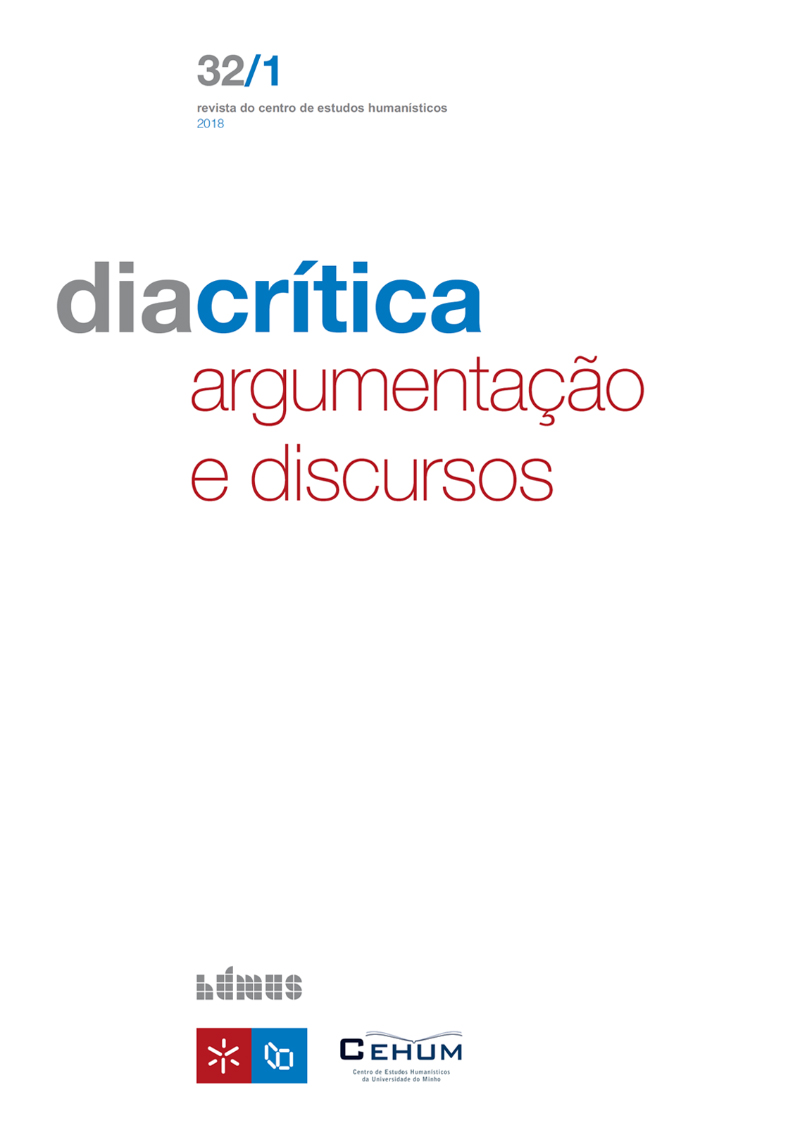The polyfunctionality of "mesmo" in contemporary European Portuguese
DOI:
https://doi.org/10.21814/diacritica.5016Keywords:
mesmo, polyfunctionality, contemporary European PortugueseAbstract
The main goal of this paper is to contribute to a thorough knowledge of the semantic, syntactic and pragmatic behavior of the item "mesmo" in contemporary European Portuguese. It is assumed that grammatical categories are flexible and there are regular inter-categorial transitions, when the research focus is the usage of language. It is also assumed that the meanings of a polyfunctional lexical item are related through ‘family resemblances’, with partial overlaps. The data analyzed in this paper were collected from CETEMPúblico, an on-line written corpus. The results of the research indicate that "mesmo" may behave as an adjective (even though a non-prototypical one), as an adverb and as an inter-clausal connective. As an adjective, we describe its external and internal dependent uses; as an adverb, two different subtypes were identified: an inclusive focus adverb and an intensifier adverb, modifying the illocutionary force of the utterance. As a connective, we highlight its contribution to the semantics of concessive constructions. In the last section of the paper, there is an attempt to relate the different values of the item.
References
Albelda Marco, M. (2005). La intensificación em el español coloquial. Universitat de Valencia.
Bosque, I. (2012). Sobre el adjectivo mismo en las construcciones de dependência interna. In T. J. Juliá et al (Orgs), Cum corde et in nova grammatica: estúdios oferecidos a Guillermo Rojo(pp. 93-108). Universidade de Santiago de Compostela.
Charnavel, I. (2010). On the sentence-internal reading of French le même (‘the same’). Proceedings of Salt 20, 216-232. DOI: https://doi.org/10.3765/salt.v20i0.2567
Corominas J & Pascual, J.A. (1989). Diccionario crítico etimológico castellano y hispânico. Madrid: Gredos.
Costa, J. (2008). O advérbio em português europeu. Lisboa: Colibri.
Cunha, C. & Cintra, L. (1984). Nova gramática do português contemporâneo. Lisboa: Sá da Costa.
Duarte, I.M. & Ponce León, R. (2015). Los marcadores assim mesmo (mesmo assim) / asimismo en portugués y en español. In S. Azzo & S. Sarrazin (Orgs), Langage et dynamique du sens. Études de linguistique ibéro-romane (pp. 125-141). Bern: Peter Lang.
Ducrot, O. (1980). Les échelles argumentatives. Paris: Minuit.
Grice, P. (1975). Logic and conversation. In P. Cole & J. Morgan (Orgs), Syntax and Semantics 3: Speech Acts (pp. 41-58). London: Academic Press. DOI: https://doi.org/10.1163/9789004368811_003
Haspelmath, M. & König, E. (1998). Concessive conditionals in the languages of Europe. DOI: https://doi.org/10.1515/9783110802610.563
In J. van der Auwera (Org.), Adverbial constructions in the language of Europe (pp. 563-640). Berlin: Mouton de Gruyter.
König, E. (1991). The meaning of focus particles: a comparative perspective. London: Routledge.
Levinson, S. (2000). Presumptive meanings. The theory of generalized conversational implicature. Cambridge, MA: The MIT Press. DOI: https://doi.org/10.7551/mitpress/5526.001.0001
Lobo, M. (2013). Subordinação adverbial. In E. P. Raposo et al. (Orgs), Gramática do Português, vol, 2 (pp. 1981-2057). Lisboa: FCG.
Lopes, A.C.M. (2016). Consequential constructions in contemporary European Portuguese. Journal of Portuguese Linguistics, 15(8). DOI:
http://doi.org/10.5334/jpl.174 DOI: https://doi.org/10.5334/jpl.174
Lopes, Ó. ([1977] 2005). Construções concessivas. Algumas reflexões formais lógico-pragmáticas. In F. Oliveira & A. M. Brito (Orgs), Entre a palavra e o discurso. Estudos de Linguística 1977-1993 (pp. 193-209). Porto: Campo das Letras.
Machado, J. P. (1967). Dicionário Etimológico da Língua Portuguesa. 2ª ed. Lisboa: Editorial Confluência. Oxford, W. (2010). Same, other and different: a first look at the micro-syntax of identity adjectives. Acedido, em julho de 2017, em http://homes.chass.utoronto.ca/~cla-acl/actes2010/actes2010.html
Peres, J., Móia, T. e Marques, R. (1999). Sobre a forma e o sentido das construções condicionais em português. In I. H. Faria (Orgs) Lindley Cintra. Homenagem ao Mestre e ao Cidadão (pp. 627-654). Lisboa: Cosmos.
Raposo, E. P. (2013). Advérbio e sintagma adverbial. In Raposo et al. (Orgs), Gramática do Português, vol 2 (pp. 1569-1684). Lisboa: FCG.
Searle. J. (1969). Speech Acts. Cambridge: Cambridge University Press. DOI: https://doi.org/10.1017/CBO9781139173438
Tabor, W. & Traugott, E. (1998). Structural scope expansion and grammaticalization. In A.G. Ramat & P. Hopper (Orgs), DOI: https://doi.org/10.1075/tsl.37.11tab
The limits of grammaticalization (pp.229-272). Amsterdam: John Benjamins.
Traugott, E. & Dasher, R. (2002). Regularity in semantic change. Cambridge: Cambridge University Press. DOI: https://doi.org/10.1017/CBO9780511486500
Vieira, R.C. (2015). Brazilian Portuguese ‘mesmo’ in ‘ele mesmo’ as a scalar focus particle: evidence from acquisitional data. ReVEL, 9, 139-150.
Downloads
Published
How to Cite
Issue
Section
License
Copyright (c) 2023 Ana Cristina Macário Lopes

This work is licensed under a Creative Commons Attribution-NonCommercial 4.0 International License.










